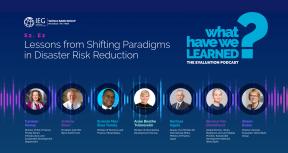Alison Evans was the third Director General of Evaluation (2019-2023) and Vice President of the Independent Evaluation Group (IEG). Prior to her role as the Director General of Evaluation in IEG, she held the following positions: Chief Commissioner of the UK’s Independent Commission for Aid Impact (ICAI), Executive Director of the Overseas Development Institute (ODI), Senior Economist at the World Bank, and as a Senior Evaluation Specialist in OED, among others.
Importance of independence in evaluation
"Our independence is our unique proposition...The work that IEG does with our objectivity and impartiality of all of our independence has a particular value and a value contribution for the institution. It comes as a trusted source of evidence. We ask the questions sometimes that others are not prepared to ask. We are therefore considered to be a credible and reliable partner for the institution. Our "I" is essential for that. But our I is not a wall. It doesn't keep us from dialoging and engaging with our management counterparts... Even as independent evaluators, we need to keep those channels open. It is part of our unique value proposition, but it is also something we have to use as an asset."
Learning from evidence
"As the World Bank Group responded to the emerging pandemic, the Independent Evaluation Group (IEG) quickly realigned its work program to focus on the new priorities. Our capacity to adapt and provide insights relevant to the unfolding crisis was largely determined by two key factors: A reform process launched earlier in the year to increase our agility and ability to innovate, and a large body of evidence built over years of evaluation.
We immediately set to mining this body of evidence to identify lessons from past global crises to help inform the Bank Group’s pandemic response. What began with a synthesis of lessons drawn from evaluations of Bank Group responses to Ebola, Avian Flu and other public health crises, led to a demand for evidence to inform a variety of other decisions, such as what worked best during past crises to support the private sector or reach the most vulnerable with social protection measures. These lessons are now collected in a library as a resource for the range of development actors and policymakers coping with the multiple consequences of the pandemic. A library that we add to continually as new challenges appear."
Making an impact
"While evaluation necessarily requires looking backwards to assess what has worked, the evidence gathered plays a vital role in mapping out what needs to be done to stay on track or adjust course. This has been especially challenging in the fast changing environment created by the pandemic, where restrictions on movement has placed severe limitations on the way we conventionally collect evidence and engage with stakeholders. Yet in uncertain times, more data is needed, not less, and maintaining the cycle of feedback, learning and course correction is even more crucial.
As the World Bank Group and other development organizations moved quickly to launch bold programs to address the impacts of the pandemic, evaluators have had to act with equal agility to orient what they do and how they do it to the ‘new normal’. That same agility is needed as we shift our focus to assessing the early results of the response, coupled with innovation to identify new sources of data and forms of engagement. With the pandemic hitting the most vulnerable the hardest, and threatening to drive millions into extreme poverty, it is essential that we provide our counterparts driving the pandemic response with robust evidence on what is working and for whom."
External Engagement and Evaluation Capacity Development
"I think it's a bigger coalition, a bigger tent, where more of us, are able to invest in evaluation, engage with it, see its value in driving good decisions and public policy. But it's much bigger tent than it is now, and the capability is shared and open source. And, we have a much bigger evidence pool to draw on to derive good development and decision-making. .. It is about building a much stronger partnership with our partner countries. The Global Evaluation Initiative (GEI) has been the epitome of our commitment to this."
"No single institution has the resources to address the current global gaps in monitoring and evaluation capacity. Addressing the scale of the need will require coordinated efforts by broad coalitions, and this collaboration is a step in that direction, providing a foundation that can be built on."
REFERENCES













